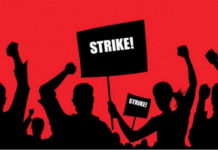Academic activities across all 46 public colleges of education remain at a standstill as the strike action by members of the Colleges of Education Teachers Association of Ghana (CETAG) has entered its third week.
The indefinite strike which started on June 14 was meant to push government to comply with the agreed arbitral awards, including payment of an additional month’s salary for duties performed by CETAG members in 2022.
Students on the Accra College of Education campus are still bearing the brunt of the strike.
Amegavu Jennifer a level 100 student explained how difficult things are for her.

“Things are not easy. It’s a bit hard for us, especially being introduced to new courses for this semester. Our seniors are taking us through some of the courses, and we are also trying to do our personal studies. We were told they will be going to court, so we are still hoping that things will get better,” she explained.
Dika Hayford said; “The strike is worrying us because we being first year students, we were not expecting this thing. But as it is happening like this, we are just hoping. I will just plead that the government does something about it so that we will not lag behind.”

According to Susan Senam another level 100 student; “Majority have gone home now and only few are left on campus. I think government should try harder and then deal with every problem they are having on any agreement they have before and let our lecturers come back to class.”

The National Labour Commission is expected to head to court on June 26, 2024 and has directed CETAG to call off the strike for negotiations to resume.
But the union has refused to back down until all of its demands are met.
The NLC has hinted it is contemplating dragging CETAG as well to court to compel its members to return to the classroom.
In 2018, public colleges of education were closed after a CETAG strike crossed a 25-day mark.
Clearly if CETAG does not call of its strike, there might be a repetition of what happened in 2018.
By Judith Brown











